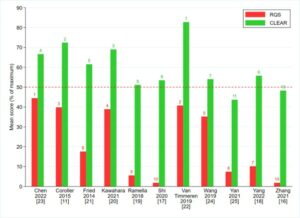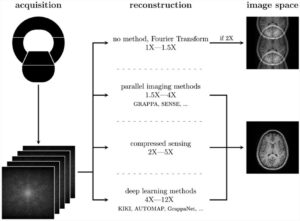Recent advances in AI have led to deep learning-based MR undersampled image reconstruction methods showing more speed-ups compared to traditional algorithms. MR undersampling is an excellent way to reduce scan time but can negatively impact image quality.
Our literature review aims to inform a broader audience about this complex topic. This highly multidisciplinary science requires the informed input of many if we want to apply these technologies effectively. For example, our work describes how a significant portion of AI image reconstruction research focuses on evaluating global image quality through statistical measures, often neglecting to incorporate task-specific assessments of the results. In a competition, the leading AI image reconstruction techniques still produced outputs with hallucinatory features, as assessed by radiologists, despite statistical metrics like SSIM showing up to 95% similarity with the original images.
This disparity between statistical measures of image quality and diagnostic accuracy, as assessed by radiologists, highlights the need for a collaborative approach. It suggests, unsurprisingly, that a single metric cannot fully capture an image’s diagnostic value. This underscores the importance of researchers and radiologists working together. For instance, radiologists could familiarize themselves with unique artifacts that might only emerge in AI-generated images, thereby providing researchers with crucial feedback during the research phase.
Our review stresses the radiologists’ critical role in research on deep learning-driven image reconstruction. They ensure these technologies perform effectively in medical contexts by offering insightful feedback and contributing high-quality datasets for AI training. Thus, collaboration between medical expertise and technology is key to enhancing patient care.
Key points:
- Deep learning-based image reconstruction algorithms are increasing both in complexity and performance.
- The evaluation of reconstructed images may mistake perceived image quality for diagnostic value.
- Collaboration with radiologists is crucial for advancing deep learning technology.
Article: Complexities of deep learning-based undersampled MR image reconstruction
Authors: Constant Richard Noordman, Derya Yakar, Joeran Bosma, Frank Frederikus Jacobus Simonis & Henkjan Huisman













